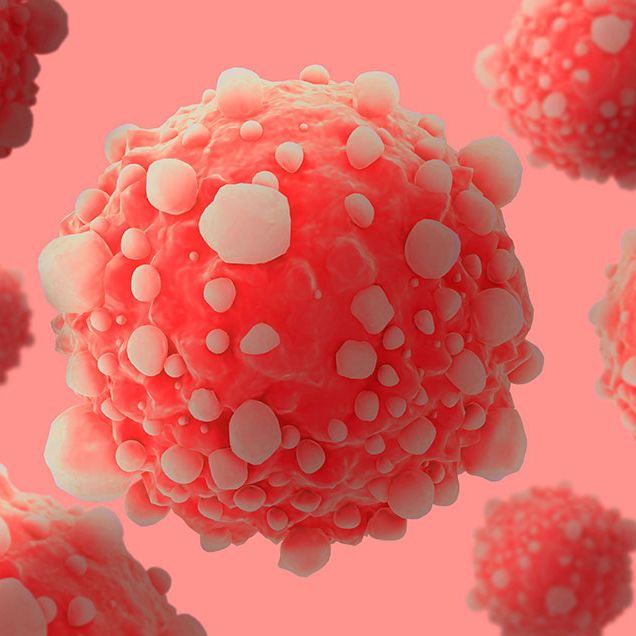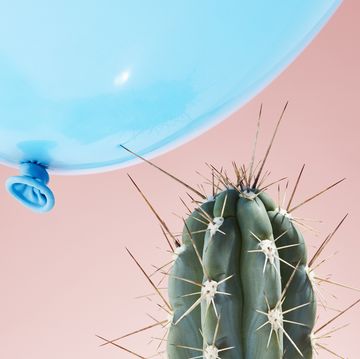Your pancreas is one of those organs you probably don't think about much. Just six inches long and tucked away behind your stomach, its main job is to help you digest your food and control your blood sugar.
Normally it does its work seamlessly, behind the scenes. But when things go wrong, it can affect your entire body.
Just under 2 percent of people will be diagnosed with pancreatic cancer in their lifetimes, according to the National Cancer Institute (NCI). It's most common in people over age 60, but has been found in people as young as their twenties and thirties.
And here's the scariest part of pancreatic cancer: It has one of the highest death rates of any cancer—a mere 8 percent of people are alive five years after diagnosis, according the NCI.
Why? Mostly because it's so hard to detect in the early, treatable stages. After all, the pancreas is located so deep inside your body that early tumors can’t be seen or felt and people often ignore, or don't even notice, pancreatic cancer symptoms until the cancer has already spread to other organs, the American Cancer Society warns.
That's why it's important to know the symptoms of pancreatic cancer and, if you do experience them, to take them seriously, says Anton Bilchik, M.D., Ph.D., professor of surgery and chief of gastrointestinal research at John Wayne Cancer Institute at Providence Saint John’s Health Center in Santa Monica, California.
"What I've observed is that women tend to wait and see the doctor until their symptoms are very bad, but because pancreatic cancer has such a high death rate, don't take the risk," he says. "If you have any of these symptoms, call your doctor; it's not silly, we'd much rather see you and have it be nothing than miss a cancer."
Here, the most common symptoms of pancreatic cancer that you need to know.
Your eyes and skin are yellow
Yellowing of the whites of the eyes and the skin is never good. It could be a sign of a host of medical problems that can include alcoholism, liver failure, and pancreatic cancer. The reason is that many pancreatic tumors start at the head of the pancreas, which is near your bile duct, Bilchik explains.
Even small tumors can put pressure on and block your bile duct, which is supposed to carry bile from the liver and gallbladder through the pancreas to the small intestine. One of bile's jobs is to remove bilirubin, a normal waste product of red blood cells, so when it can't do its job the excess bilirubin causes jaundice and yellow eyes.
Regardless of the cause, this is one symptom you should never ignore.
You look four months pregnant
Bloating after a big meal is normal, staying that way for days isn't. As pancreatic tumors grow larger, they can cause your belly to distend, Bilchik says. This is one of the first signs women often notice, but they don't call their doctor about it because bloating seems like a small thing to worry about.
It's worth getting checked out, he says. It probably isn't cancer, but on the off chance it is (and ovarian cancer also lists bloating as an early sign), it's better to be safe than sorry.
Related: 8 Reasons Why Your Period Is Suddenly Shorter Than Normal
Your favorite dessert makes your stomach turn
Loss of appetite is another early indicator of pancreatic cancer. That's because as tumors grow in the abdomen they can put pressure on surrounding organs, including your stomach, Bilchik says. The result: you feel nauseous or feel full even if you haven't eaten in hours. Eating may even feel painful.
Find out what you MUST do the next time you go to the doctor:
You're unintentionally dropping weight
That loss of appetite can easily lead to rapid weight loss, typically defined as losing more than 5 percent of your body weight in the span of six months to a year. "If you can't explain the weight loss by some other reason, you need to be seen," Bilchik says.
Your lower back is killing you
As a pancreatic tumor grows it not only puts pressure on internal organs but also your lower spine and back muscles, causing a constant, dull pain. Thanks to menstrual cramps, women are used to dealing with low-back pain on a regular basis. So how do you know if your lower back soreness is due to PMS, too many deadlifts, or something more sinister? If the pain is constant (e.g. it doesn't disappear with your period ending) it's something to get checked out, Bilchik says.
Related: 9 Reasons Why You've Got Period Symptoms But No Period
Your pee looks more like tea
Dark-colored urine is a sign of dehydration, but it's also often the very first sign of jaundice that people notice. As the tumor causes less bile to be excreted and bilirubin levels in the blood to increase, the urine becomes brown in color, the American Cancer Society explains.
If increasing your water intake doesn't return your pee to its usual light lemonade shade, it's time to get it checked out as jaundice is an early sign of pancreatic cancer, Bilchik says.
You can't stop itching
All-over itchy skin is an early warning sign of jaundice and pancreatic cancer. As the bilirubin builds up in your skin, it can cause it to itch before it even turns yellow. "I've seen patients who've come in and said, 'I have this itchy spot' and then when they lift up their shirt you can see it's turning yellow," Bilchik says.
So if you can't pinpoint your itchiness to other causes, like bug bites or an allergic reaction, and lotion doesn't relieve it, get it checked out.
Related: This Is Why Your Vagina Is So Itchy—And How To Make It Stop
You have alien poops
Grayish, light-colored, or greasy poop is as bad for you as it is gross. Again, the reason goes back to bilirubin. It's typically excreted through your bowels, as poop, giving fecal matter its characteristic dark brown color. But when there isn't enough bile because a tumor is blocking it, the bilirubin stays in your system instead of going out through your poop. This can change the color and texture of your bowel movements, the ACS says.
One potential cause is a pancreatic tumor, but the other options (like liver disease or a gastrointestinal infection) aren't great either, so definitely call your doctor right away if your poo is consistently pale or floats in the toilet.
Your stomach hurts for no good reason
Going to the doctor to complain of a tummy ache may seem like something only toddlers do, but this kind of unspecified pain can be an early symptom of pancreatic cancer, Bilchik says. Because of the pancreas' location at the back of your lower abdomen, behind your stomach, a tumor there can give you a constant low-key stomach ache, regardless of what you ate.
Related: The Symptoms Of Colon Cancer That Every Young Woman Should Know
You just feel off
Here's the scary thing about pancreatic cancer: Once the symptoms are obvious and definitive, your prognosis is likely very poor, Bilchik says.
To catch it early, you have to pay attention to the more vague symptoms, including a general feeling of being unwell that lasts for more than a week or two and isn't related to an obvious cause like having the flu. Remember, it's always better to get it checked and have it be nothing than to miss something crucial.













